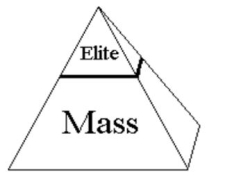Deck 2: Conceptions of Democracy
Question
Question
Question
Question
Question
Question
Question
Question
Question
Question
Question

Unlock Deck
Sign up to unlock the cards in this deck!
Unlock Deck
Unlock Deck
1/11
Play
Full screen (f)
Deck 2: Conceptions of Democracy
1
A comparativist who takes a transnational approach mainly focuses on:
A) A single country case study
B) A country where they speak a languge different from the researcher's own language
C) Multinational coporations and migration studies
D) An issue or theme-oriented approach studied by comparing a number of countries, often in different cultural regions
A) A single country case study
B) A country where they speak a languge different from the researcher's own language
C) Multinational coporations and migration studies
D) An issue or theme-oriented approach studied by comparing a number of countries, often in different cultural regions
D
2
What conception of demoracy is most associated with the pluralist school of thought?
A) Direct democracy
B) Participatory democracy
C) Worker democracy
D) Polyarchy
A) Direct democracy
B) Participatory democracy
C) Worker democracy
D) Polyarchy
D
3
What theory does this figure most represent? 
A) Pluralism
B) Direct Democracy
C) Socialism
D) Iron Law of Oligarchy

A) Pluralism
B) Direct Democracy
C) Socialism
D) Iron Law of Oligarchy
D
4
The global tendency toward representative democracy during the era of the "Washington consensus" is called:
A) The Third Wave
B) The Pink Wave
C) Hegemonic decline
D) Populism
A) The Third Wave
B) The Pink Wave
C) Hegemonic decline
D) Populism

Unlock Deck
Unlock for access to all 11 flashcards in this deck.
Unlock Deck
k this deck
5
Which one of these four terms describes the kind of system of government pluralists hope to see develop in Latin America?
A) Illiberal democracy
B) Representative democracy
C) Delegative democracy
D) Hybrid regimes
A) Illiberal democracy
B) Representative democracy
C) Delegative democracy
D) Hybrid regimes

Unlock Deck
Unlock for access to all 11 flashcards in this deck.
Unlock Deck
k this deck
6
Latin Americanists who stress political culture in studies of Latin America often refer to corporatism. This refers to...
A) The economic power of big foreign businesses in the region
B) A tendency for interests groups to come under influence of parties and government, rather than the other way around
C) Cooperative enterprise movements in the region
D) Worker democracy
A) The economic power of big foreign businesses in the region
B) A tendency for interests groups to come under influence of parties and government, rather than the other way around
C) Cooperative enterprise movements in the region
D) Worker democracy

Unlock Deck
Unlock for access to all 11 flashcards in this deck.
Unlock Deck
k this deck
7
A political strongman in Spanish-speaking Latin America is often known as
A) Macho
B) Compadrazgo
C) Caudillo
D) Politico
A) Macho
B) Compadrazgo
C) Caudillo
D) Politico

Unlock Deck
Unlock for access to all 11 flashcards in this deck.
Unlock Deck
k this deck
8
When a politican builds a base of popular support by rewarding his supporters, but without necessarily violating a law, this is best described as:
A) Clientelism
B) Corruption
C) Socialism
D) Bribery
A) Clientelism
B) Corruption
C) Socialism
D) Bribery

Unlock Deck
Unlock for access to all 11 flashcards in this deck.
Unlock Deck
k this deck
9
The Mexican Zapatistas are known for rejecting...
A) The need for revolution
B) Indigenous ways of life
C) Democracy
D) Revolutionary vanguards acting in the name of the people
A) The need for revolution
B) Indigenous ways of life
C) Democracy
D) Revolutionary vanguards acting in the name of the people

Unlock Deck
Unlock for access to all 11 flashcards in this deck.
Unlock Deck
k this deck
10
Fidel Castro argued that...
A) Cubans must to wait until the country is developed to institute democracy
B) that Cuba is a democracy, but of a different kind from liberal
C) that Cuban democracy is perfect and fully developed
D) that Cuba allows opposition parties to run against the Communist Party
A) Cubans must to wait until the country is developed to institute democracy
B) that Cuba is a democracy, but of a different kind from liberal
C) that Cuban democracy is perfect and fully developed
D) that Cuba allows opposition parties to run against the Communist Party

Unlock Deck
Unlock for access to all 11 flashcards in this deck.
Unlock Deck
k this deck
11
In 2018, how did Latin American democracies rank by liberal criteria versus democracy in the US?
A) No Latin American countries ranked above the US on democracy.
B) A few Latin Amercan countries ranked close or even above the US.
C) The United States ranked below Latin American countries, except for a handful, such as Cuba and Venezuela
D) In general, there are no attempts to compare the US and Latin American countries on liberal democracy
A) No Latin American countries ranked above the US on democracy.
B) A few Latin Amercan countries ranked close or even above the US.
C) The United States ranked below Latin American countries, except for a handful, such as Cuba and Venezuela
D) In general, there are no attempts to compare the US and Latin American countries on liberal democracy

Unlock Deck
Unlock for access to all 11 flashcards in this deck.
Unlock Deck
k this deck



